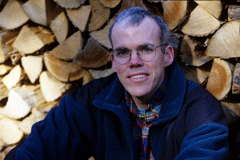Step It Up 2007
Air Date: Week of March 2, 2007

Bill McKibben (Courtesy of Step It Up 2007)
Author and environmentalist Bill McKibben and a small team of recent college graduates have launched a grassroots movement via cyberspace to combat climate change. They’re organizing a nationwide day of rallies on April 14th to urge Congress to reduce greenhouse gas emissions 80 percent by 2050. Host Steve Curwood talks with McKibben and his web director, Jon Warnow, about their call for climate action.
Transcript
CURWOOD: Bill McKibben has been a commanding voice on environmental issues for years. He’s a scholar, a best-selling author, and a frequent contributor to major publications. And now Bill McKibben has started a grass-roots campaign to push the U.S. government to commit to reducing carbon emissions 80% by the year 2050. It’s called Step it Up 2007, and he and his web-organizer, Jon Warnow join me from Burlington, VT to talk about the booming movement and its call for demonstrations and events around the country on April 14th. Um, Bill, I understand you have more than 750 sites already signed up.
What kinds of things are gonna be going on?
MCKIBBEN: Well, maybe I’ll tell you some of the favorite things that I’ve heard and Jon can chime in with some of his. One of the things we’ve been talking about with people is try to do something in a place that really makes it clear to you and clear to everyone else what the cost of global warming is going to be. So there are teams of scuba divers who will be rallying underwater with a banner off the endangered coral reefs in Key West. There are teams of skiers who are doing a kind of two day ascent of mountains dwindling glaciers in Montana and Wyoming. They’re going to do a sort of cyber cast from the summit and then ski in formation down to the town below and take part in rallies there. There’ll be climbers on many of the kinda iconic rock faces around the country. There’ll be a hybrid car parade across the Golden Gate Bridge. Jon what are some of yours?

Bill McKibben (Courtesy of Step It Up 2007)
CURWOOD: Where will you be that day Jon?
WARNOW: Ah, that’s yet to be determined. It’s very likely that I’ll be behind a computer screen somewhere, tapping furiously on my keyboard, trying to figure out how all this is going to come together in the most elegant and smooth way possible.
CURWOOD: Now Bill McKibben you say this big demonstration is sort of a virtual march on Washington. Why not a march on Washington?
MCKIBBEN: Um, we really wanted this to be, we wanted Congress to know that this came from people in their districts who consider this a top priority issue and we wanted everyone… here’s the real answer. The picture in my mind's eye from the beginning of this, has been that at the end of the day on April 14th there’re going to be pictures pouring in from these hundreds upon hundreds of rallies. We’ll have a kinda cascade of images of people showing their concern in large numbers, you know, when it’s all said and done. But from every corner of this country and those images will somehow make this whole day more than the sum of its parts. I mean it’ll do a lot of good just community by community to educate congress people. But it is also going to have a kinda national and, and long lived presence on the web and on all the other ways that we can figure out how to utilize those beautiful pictures.
CURWOOD: So John, you’re handling the online aspect of this campaign. Can you describe how the internet and the website have, have, made this all possible?

Jon Warnow (Courtesy of Step It Up 2007)
CURWOOD: So this is nothing from the top down? This is…
MCKIBBEN: Well Steve, just to fill you in, in a sense what we did is nothing more than an invitation to a party, and a pot luck at that. And said look come on April 14th and bring your best dish.
CURWOOD: Jon, so why does a self-respecting college graduate work for what, 100 bucks a week instead of a more lucrative occupation and no future prospects after April 14th?
WARNOW: (laughs) It’s a fine question but I think that many people my age really do view global warming as the challenge of our generation. We recognize that we will be alive to see the worst ramifications of this thing if we don’t act quickly. The apathetic college student that’s portrayed in the mainstream media is a far cry from what we’re actually seeing on campuses nation wide. We’re seeing a generation of young people who are especially excited and enthused to get involved in this issue that we need to come together on very quickly.
CURWOOD: Now in the social movements of the past there’s been a value that people have been striving towards but also a value that they’ve been working against; for the rights of people of color and women, against the Vietnam War. With very specific targets and sometimes even villains. Who are your Bull Connors. Who are your Richard Nixons of this particular movement?
MCKIBBEN: Well, the first thing to be said is really nobody comes off all that well. We’ve had a twenty year bipartisan effort to accomplish nothing and it’s been highly successful. In the last six years it’s clear that things have taken an even more extreme turn for the worse. That the Bush Administration and some of the environmental leadership on Capitol Hill, people like Senator Imhoff of Oklahoma have been particularly obstructionist. Now there’s an opening. It’s not an easy opening. On the other side are forces like Exxon Mobil. Exxon Mobil made 40 billion dollars last year. We’re not going to beat them with money. We’re going to beat them with bodies, with people that are willing to make a really creative, and really powerful commitment to this with the same kind of moral urgency that animated the civil rights movement.
CURWOOD: Bill, before you go, um you know, any mass movement from the sixties anyway had protest songs. What do you guys got?
MCKIBBEN: You’re absolutely right. One of the things the environmental movement has been lacking is it’s not a singing movement. And that’s one of the first things we wanted to figure out how to address. And what do you know the same set of tools came in absolutely handy to do it. We put up a call partly through a website called Muse Cool the Planet for songwriters who wanted to write songs about climate change. And pretty soon they were flooding in. You can see a variety of them on our website including our own more or less official theme song, Step it Up by the Gallerists, which we play each morning before we get out of bed, you know, in order to get ourselves charged up for the day’s work.
[MUSIC: The Gallerists “Step It Up Theme” from ‘StepItUp2007.org’ (Muse Cool The Planet – 2007)]
CURWOOD: John Warnow is the web organizer and Bill McKibben is the uber-organizer of Step it Up 2007. Thank you gentlemen both.
MCKIBBEN: Thank you Steve.
WARNOW: Thank you.
Links
Living on Earth wants to hear from you!
Living on Earth
62 Calef Highway, Suite 212
Lee, NH 03861
Telephone: 617-287-4121
E-mail: comments@loe.org
Newsletter [Click here]
Donate to Living on Earth!
Living on Earth is an independent media program and relies entirely on contributions from listeners and institutions supporting public service. Please donate now to preserve an independent environmental voice.
NewsletterLiving on Earth offers a weekly delivery of the show's rundown to your mailbox. Sign up for our newsletter today!
 Sailors For The Sea: Be the change you want to sea.
Sailors For The Sea: Be the change you want to sea.
 The Grantham Foundation for the Protection of the Environment: Committed to protecting and improving the health of the global environment.
The Grantham Foundation for the Protection of the Environment: Committed to protecting and improving the health of the global environment.
 Contribute to Living on Earth and receive, as our gift to you, an archival print of one of Mark Seth Lender's extraordinary wildlife photographs. Follow the link to see Mark's current collection of photographs.
Contribute to Living on Earth and receive, as our gift to you, an archival print of one of Mark Seth Lender's extraordinary wildlife photographs. Follow the link to see Mark's current collection of photographs.
 Buy a signed copy of Mark Seth Lender's book Smeagull the Seagull & support Living on Earth
Buy a signed copy of Mark Seth Lender's book Smeagull the Seagull & support Living on Earth

